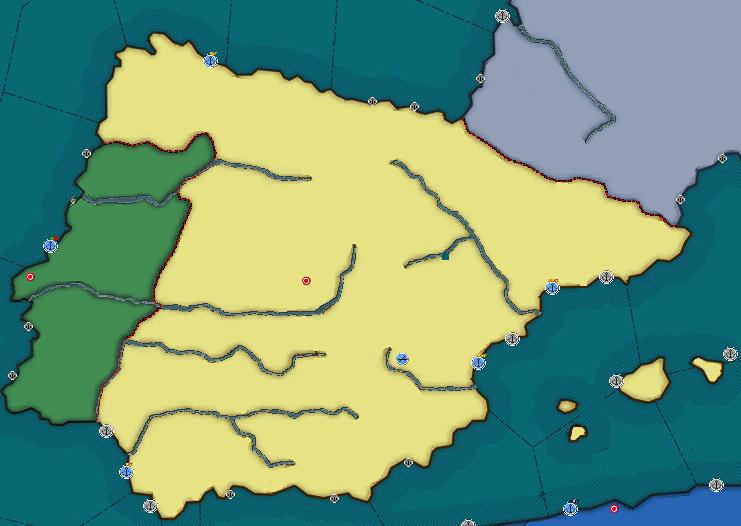Portugal
From Kaiserreich
| ||||
| Motto Deus, Pátria e Familia (God, Fatherland and Family) | ||||
| Anthem A Portuguesa | ||||

| ||||
|
| ||||
| Official Languages | Portuguese | |||
| Capital | Lisbon | |||
| Head of State | Antonio da Fragosa Carmona | |||
| Head of Government | Antonio da Oliveira Salazar | |||
| Establishment - Establishment of the Republic | October 5 1910 | |||
| Government | Semi-presidential republic | |||
| Currency | Portuguese escudo | |||
| Area | 92 391 km² | |||
| with colonies | 2 180 490 km² | |||
| Population | About 7 millions | |||
Portugal is a country in South West Europe; it borders the Kingdom of Spain to the east. Through its colonial possessions it also borders Mittelafrika, South Africa and National France in Africa and Algostasien GmbH and Dutch East Indies in Asia.
Contents |
History
During the 19th century, Portugal was characterized by the internal struggles between republicans and supporters of a constitutional monarchy, which caused a deep rift in the country. In 1910 a coup of Portuguese republican officers against King Emanuel II abolished the rule of the Royal House of Braganca. Teófilo Fernandes Braga became the first president of the Republic; he proclaimed civil liberties and emancipated women in family law. An agricultural reform failed, however, because of the opposition of the aristocracy. The gravest inheritance of the republic was the desolate economy which was completely oriented towards trade with Great Britain. The inner conflict caused the quick succession of eight presidents and forty-four governments till 1926. The Weltkrieg, which Portugal joined on the side of the Entente, made matters worse. The merchant marine suffered heavy losses from the German U-Boats, and trade with the colonies collapsed, but the Portuguese colonial empire was left intact, as the country was too far from German armies and protected by the British government. The situation escalated with the end of relationships with Britain, due to the Socialist revolution in England. There were two military coup attempts in 1926 during which the republican constitution was abolished. General António Óscar Fragoso Carmona took the reigns of the government and was confirmed in office through elections held in 1928. He founded the Second Republic which he led in authoritarian fashion ever since. António Oliveira Salazar became his minister of finances with many authorizations. In 1932 Salazar was appointed President of the Council and established an authoritarian system, based on nationalist and Catholic values and corporatism as an economic model.
Politics
President of the Republic: Antonio da Fragosa Carmona
President of the Council: Antonio da Oliveira Salazar
Minister of Foreign Affairs: Antonio da Oliveira Salazar
Minister of Finance: Raul Brandao
Minister of Justice and Internal Administration: Mario Pais Sousa
Director of the Polícia de Vigilância e de Defesa do Estado: Pedro Teotónio Pereira
Chief of Staff: Tasso Miranda Cabral
Chief of Exército: J.A. Lobato Guerra
Chief of Marinha: Jaime Afreixo
Chief of Força Aérea: Manuel Gouveia
Military
Army
The Exército do Portugal consists in only two infantry division. It will probably be expanded in the future, as internal turmoil is increasing in the Kingdom of Spain in the east and Mittelafrika might once again threaten the Portoguese colonies in Africa.
Navy
The Marinha do Portugal comprise one submarine, two destroyers and two transport flotilla. Its main purpose is to protect the Portoguese Merchant Marine and secure the commerce between Portugal and its colonies.
Air Force
The Força Aérea do Portugal consist of a single squadron of tactical bombers.
Foreign Relations
Very good relations with Kingdom of Spain and Brazil.
Good relations with Italian Federation and Germany.
Colonial Empire
Portuguese colonies in Africa: Cape Verde, São Tomé and Príncipe, Portuguese Guinea, Overseas Province of Angola (with Cabinda) and Overseas Province of Mozambique.
Portuguese colonies in Asia: Macao and Portuguese Timor.


